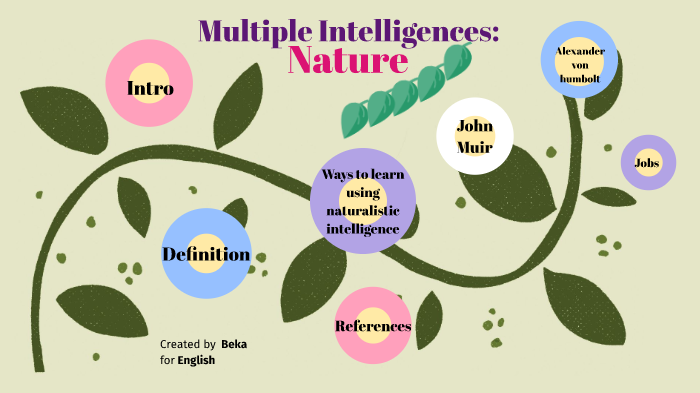
Gardner's Theory of Multiple Intelligences
The concept of multiple intelligences is a theory proposed by Harvard psychologist Howard Gardner. When you hear the word intelligence, the concept of IQ testing may immediately come to mind. Intelligence is often defined as our intellectual potential; something we are born with, something that can be measured, and a capacity that is difficult to change. In recent years, however, other views of intelligence have emerged, including Gardner's suggestion that multiple different types of intelligence may exist. The eight intelligences according to Gardner are:
1. Visual-Spatial Intelligence
People who are strong in visual-spatial intelligence are good at visualizing things. These individuals are often good with directions as well as maps, charts, videos, and pictures
Strengths
Visual and spatial judgment
Characteristics
People with visual-spatial intelligence:
- Read and write for enjoyment
- Are good at putting puzzles together
- Interpret pictures, graphs, and charts well
- Enjoy drawing, painting, and the visual arts
- Recognize patterns easily
Potential Career Choices
If you're strong in visual-spatial intelligence, good career choices for you are:
- Architect
- Artist
- Engineer
People who are strong in linguistic-verbal intelligence are able to use words well, both when writing and speaking. These individuals are typically very good at writing stories, memorizing information, and reading.
Strengths
Words, language, and writing
Characteristics
People with linguistic-verbal intelligence:
- Remember written and spoken information
- Enjoy reading and writing
- Debate or give persuasive speeches
- Are able to explain things well
- Use humor when telling stories
Potential Career Choices
If you're strong in linguistic-verbal intelligence, good career choices for you are:
- Writer/journalist
- Lawyer
- Teacher
3. Logical-Mathematical Intelligence
People who are strong in logical-mathematical intelligence are good at reasoning, recognizing patterns, and logically analyzing problems. These individuals tend to think conceptually about numbers, relationships, and patterns.6
Strengths
Analyzing problems and mathematical operations
Characteristics
People with logical-mathematical intelligence:
- Have excellent problem-solving skills
- Enjoy thinking about abstract ideas
- Like conducting scientific experiments
- Can solve complex computations
Potential Career Choices
If you're strong in logical-mathematical intelligence, good career choices for you are:
- Scientist
- Mathematician
- Computer programmer
- Engineer
- Accountant

Those who have high bodily-kinesthetic intelligence are said to be good at body movement, performing actions, and physical control. People who are strong in this area tend to have excellent hand-eye coordination and dexterity.6
Strengths
Physical movement, motor control
Characteristics
People with bodily-kinesthetic intelligence:
- Are skilled at dancing and sports
- Enjoy creating things with his or her hands
- Have excellent physical coordination
- Remember by doing, rather than hearing or seeing
Potential Career Choices
If you're strong in bodily-kinesthetic intelligence, good career choices for you are:
- Craftsperson
- Dancer
- Builder
- Surgeon
- Sculptor
- Actor
5. Musical Intelligence
People who have strong musical intelligence are good at thinking in patterns, rhythms, and sounds. They have a strong appreciation for music and are often good at musical composition and performance.7
Strengths
Rhythm and music
Characteristics
People with musical intelligence:
- Enjoy singing and playing musical instruments
- Recognize musical patterns and tones easily
- Remember songs and melodies
- Have a rich understanding of musical structure, rhythm, and notes
Potential Career Choices
If you're strong in musical intelligence, good career choices for you are:
- Musician
- Composer
- Singer
- Music teacher
- Conductor
6. Interpersonal Intelligence
Those who have strong interpersonal intelligence are good at understanding and interacting with other people. These individuals are skilled at assessing the emotions, motivations, desires, and intentions of those around them.7
Strengths
Understanding and relating to other people
Characteristics
People with interpersonal intelligence:
- Communicate well verbally
- Are skilled at nonverbal communication
- See situations from different perspectives
- Create positive relationships with others
- Resolve conflicts in group settings
Potential Career Choices
If you're strong in interpersonal intelligence, good career choices for you are:
- Psychologist
- Philosopher
- Counselor
- Salesperson
- Politician
7. Intrapersonal Intelligence
Individuals who are strong in intrapersonal intelligence are good at being aware of their own emotional states, feelings, and motivations. They tend to enjoy self-reflection and analysis, including daydreaming, exploring relationships with others, and assessing their personal strengths.7
Strengths
Introspection and self-reflection
Characteristics 
People with intrapersonal intelligence:
- Analyze their strengths and weaknesses well
- Enjoy analyzing theories and ideas
- Have excellent self-awareness
- Understand the basis for his or her own motivations and feelings
Potential Career Choices
If you're strong in intrapersonal intelligence, good career choices for you are:
- Philosopher
- Writer
- Theorist
- Scientist
 8. Naturalistic Intelligence
8. Naturalistic Intelligence
Naturalistic is the most recent addition to Gardner’s theory and has been met with more resistance than his original seven intelligences. According to Gardner, individuals who are high in this type of intelligence are more in tune with nature and are often interested in nurturing, exploring the environment, and learning about other species. These individuals are said to be highly aware of even subtle changes to their environments.
Strengths
Finding patterns and relationships to nature
Characteristics
People with naturalistic intelligence:
- Are interested in subjects such as botany, biology, and zoology
- Categorize and catalog information easily
- Enjoy camping, gardening, hiking, and exploring the outdoors
- Dislikes learning unfamiliar topics that have no connection to nature
Potential Career Choices
If you're strong in naturalistic intelligence, good career choices for you are:
- Biologist
- Conservationist
- Gardener
- Farmer
Conclusion
Despite the criticism, the theory of multiple intelligences has changed how we think about intelligence and individual cognitive abilities in many respects. The theory suggests that intelligence isn't just a trait but it can be nurtured in different ways to prompt people to identify their unique strengths and preferences. Gardner's theory can also be applied in various aspects of everyday life to explain certain behaviors and tendencies or even personal interests. Ultimately, eLearning professionals can use it to shape their instructional strategies and optimize learners' experiences

Article by Ida Darbinyan
Published 31 Jul 2024